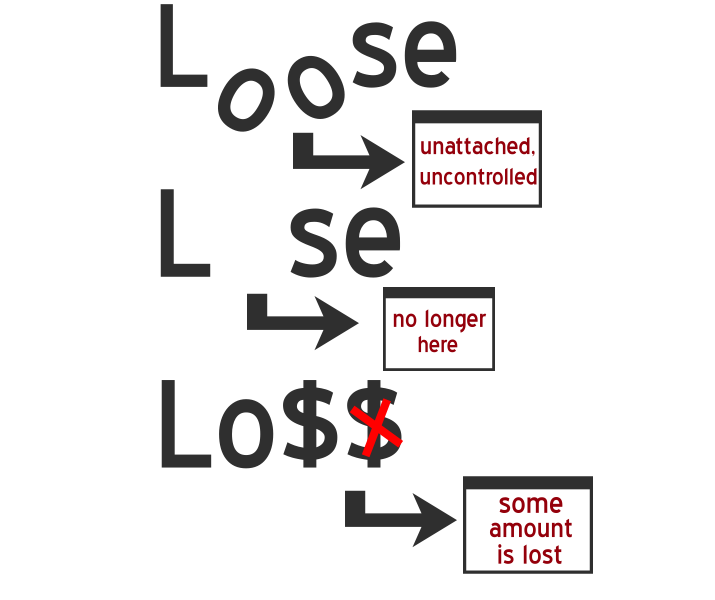Language can often be a source of confusion, especially when it comes to similar words that have distinct meanings. One such pair is "loss" and "lost." These two words might seem interchangeable at first glance, but they serve different purposes in both written and spoken language. Understanding the nuances of these terms is crucial for effective communication, especially in contexts that involve personal feelings, finance, or even legal matters.
The word "loss" is primarily a noun, representing the state of losing something or the act of losing. It can pertain to various contexts, from emotional losses, such as the death of a loved one, to financial losses in business. On the other hand, "lost" is the past tense of the verb "to lose," indicating that the action of losing has already occurred. This distinction plays a significant role in how we convey our thoughts and emotions.
In this article, we will delve deeper into the intricacies of "loss" and "lost." We will explore their definitions, usage, and the contexts in which each word is appropriate. By the end of this discussion, readers will have a clearer understanding of these terms, enhancing their vocabulary and improving their communication skills.
What is the Definition of Loss?
Loss is a noun that refers to the state of no longer having something or someone. It can be used in various contexts, such as:
- Emotional loss (e.g., losing a loved one)
- Financial loss (e.g., losing money in a business venture)
- Physical loss (e.g., losing a possession)
Understanding the breadth of the term "loss" can help individuals articulate their feelings and experiences more accurately.
What Does Lost Mean?
Lost is the past tense of the verb "to lose." When you say something is lost, you imply that it has been misplaced or that it is no longer in your possession. For example, if you say, "I lost my keys," it indicates that the action of losing occurred in the past. The term is primarily used in a temporal context and can describe both physical objects and abstract concepts.
How Can Loss vs Lost Affect Our Communication?
The distinction between "loss" and "lost" can significantly impact how we express ourselves. Using the correct term in a given situation can convey clarity and precision. For instance:
- “The loss of my job was devastating.” (correct usage of loss)
- “I lost my job last month.” (correct usage of lost)
Misusing these terms can lead to misunderstandings and miscommunication. Therefore, knowing when to use "loss" versus "lost" is essential for effective dialogue.
What Are Common Misconceptions About Loss vs Lost?
Many people confuse "loss" and "lost" due to their similar spellings and meanings. Some common misconceptions include:
- Believing that "loss" can be used as a verb
- Using "lost" in situations where "loss" is appropriate
- Thinking the two terms can be used interchangeably
Clarifying these misconceptions is vital for improving language skills and ensuring precise communication.
How Do Cultural Contexts Influence the Meaning of Loss and Lost?
Cultural contexts can affect how we interpret "loss" and "lost." For example, in some cultures, discussing emotional loss may be taboo, while in others, it may be a common topic of conversation. Similarly, the perception of financial loss can vary based on cultural attitudes toward money and success. Understanding these cultural nuances can enhance our communication when discussing these concepts with individuals from different backgrounds.
Can Loss vs Lost Be Used in Legal Contexts?
Yes, both terms can be relevant in legal contexts. "Loss" may refer to damages or injuries suffered as a result of another party's actions, while "lost" can describe the state of having lost rights or property. For example:
- “The plaintiff suffered a significant loss due to the accident.” (loss)
- “The defendant lost the case.” (lost)
Understanding the implications of these terms in legal language is crucial for clear communication in legal documents and discussions.
How Can We Remember the Difference Between Loss and Lost?
To remember the difference between "loss" and "lost," consider the following tips:
- Associate "loss" with the noun form and think of it as a state of being.
- Remember that "lost" is an action that has already occurred.
- Practice using both terms in sentences to reinforce understanding.
By using these strategies, individuals can improve their grasp of these terms and enhance their communication skills.
Conclusion: Why Understanding Loss vs Lost Matters
In conclusion, the distinction between "loss" and "lost" is more than just a matter of semantics. Understanding these terms enhances our communication, allowing us to express ourselves more clearly and effectively. Whether discussing personal experiences or professional matters, knowing when to use "loss" and "lost" can make a significant difference in how our messages are received. So, the next time you find yourself pondering the "loss vs lost" debate, remember the importance of clarity in language and strive for precision in your communication.
You Might Also Like
Understanding The Mystique Of February 5 Zodiac SignUnveiling The Mysteries Of The January 29 Sign
Unlocking The Mysteries Of The 8 November Born Personality
Unraveling The Phenomenon Of The Mean Girls Musical
Discovering Quincy Brown: A Journey Through His Movies And TV Shows
Article Recommendations
- Wentworth Miller Husband
- Kim Nam Gil
- Jessica Alba
- Elijah Hewson Height
- Thomas Rhett And Lauren Akins
- Tia Hernlen
- Eros Philadelphia
- Jessica Capshaw Husband
- Auto Kilcher
- Jessica Alba Diddy


